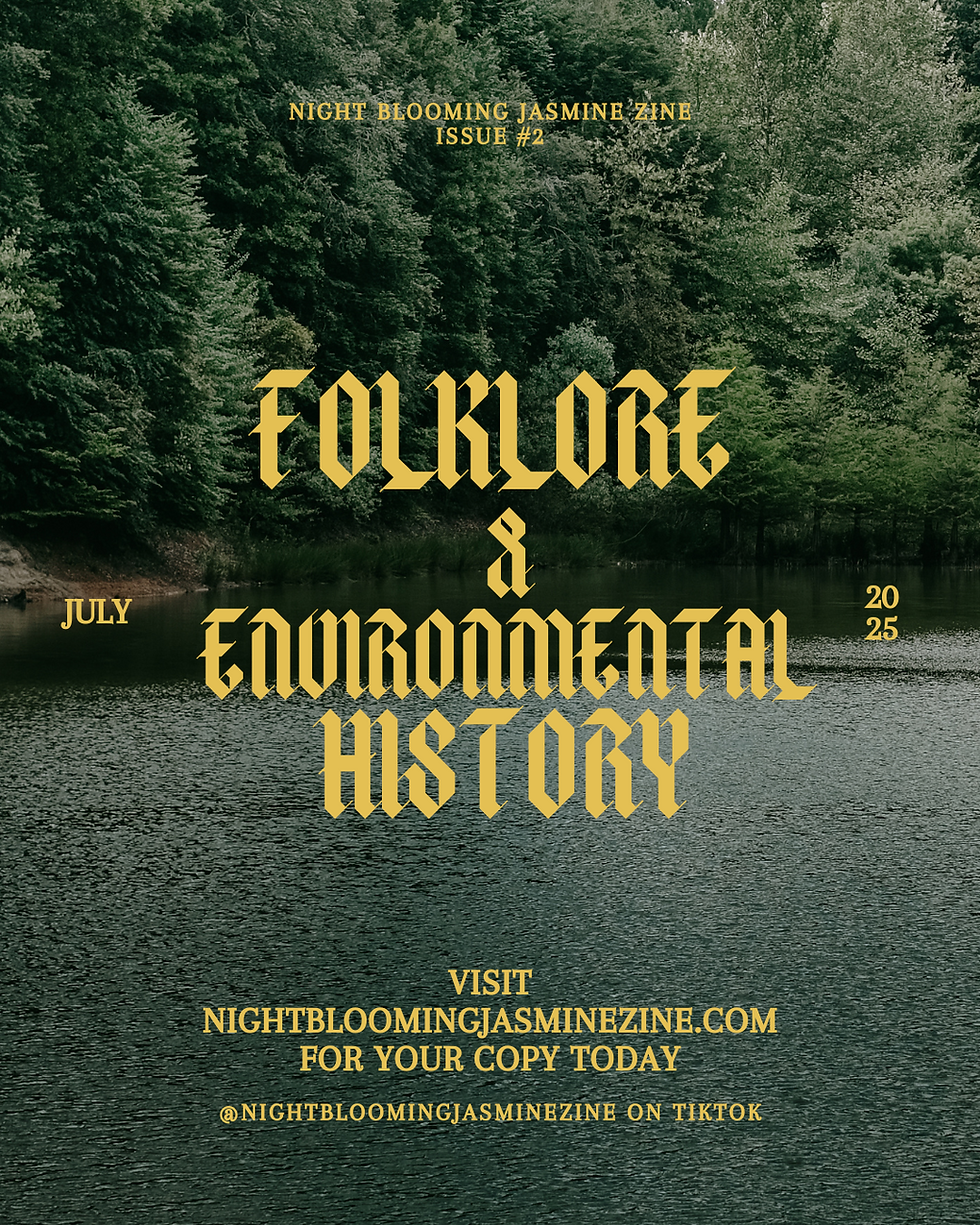Exploring the Interconnectedness of Folklore and Environmental History in Our Upcoming Second Zine Issue
- elaine@nightbloomingjasminezine

- Jul 7, 2025
- 3 min read
Folklore and environmental history are intertwined fields that together create a complex narrative about how we as humans connect with the natural world. These areas, while possibly appearing different, significantly overlap and illuminate the cultural values and knowledge we inherit from those before us. Our upcoming second issue of our physical zine takes a closer look at this intriguing conversion, highlighting how folklore not only reflects historical experiences but also aids in our understanding of biodiversity and sustainable practices to this day.
The Role of Environmental History
Environmental history studies how human activities and cultural practices shape ecosystems and how environmental changes affect human communities. This field aims to understand the mutual impacts between society and nature over time, shedding light on sustainability and resource management.
What Folklore Means to Environmental History
At its heart, folklore encompasses the oral and written traditions that include storytelling, myths, songs, and rituals passed down generations. It acts as a vessel for culture, conveying the beliefs, values, and experiences of communities. Folklore often emphasizes the importance of nature, illustrating the deep connections between humans and their environment. Folklore also is used as a means for transmitting knowledge regarding the environment.
For example, many indigenous folktales center around the concept of Mother Earth, portraying land as a nurturing & powerful entity. These narratives teach respect for nature, stating that preservation is vital for future generations. This provides us with insight on the relationship between folklore and sustainable practices.
The Ripple Effect of Folklore on Sustainability
Folklore is packed with timeless wisdom related to sustainable living and biodiversity. These tales often impart lessons about local ecosystems, teaching people how to live in harmony with nature. Such narratives remind us of the interconnectedness of life and serve as important guides for sustainable practices.
The Cultural Significance of Nature in Folklore
Nature's role in folklore cannot be understated. It provides the backdrop for many stories and legends, often personifying elements like rivers and mountains with their own spirits. These tales instill a sense of respect for the environment by humanizing it and emphasize ethical relationships with the natural world. This issue of our zine examines the idea of using traditional ecological knowledge to maintain environmental balance in our modern world.
Bridging the Gap: Folklore and Modern Conservation Efforts
As we face urgent environmental challenges, the value of folklore in conservation efforts is increasingly recognized. Indigenous knowledge, often rooted in ancient tales and traditions, can provide sustainable methods for managing land and resources. For example, in Brazil, indigenous practices that promote agroforestry have been shown to bolster biodiversity and reduce deforestation rates. (Note: I took a class regarding deforestation in the Amazon rainforest, and I long wondered how indigenous knowledge and folklore could be used to bolster modern conservation efforts there.)
Shaping Future Awareness on Folklore and the Environment
As we explore the bonds between folklore and environmental history, it becomes clear that these fields offer important lessons about resilience and adaptability. Folklore not only connects generations but serves as a powerful tool for raising awareness about current environmental issues. Here lies the essence of our zine as a whole: folklore is alive. It's not some dead history that we can discard and forget. It flows through us, every moment of every day.
With environmental challenges on the rise, acknowledging folklore's importance can motivate individuals and communities towards sustainable actions. By reviving old stories and understanding their modern relevance, we can engage new audiences in the ongoing discourse around conservation and even environmental justice.
A Journey Worth Taking
Our second issue of the physical zine promises a deep exploration of how folklore and environmental history intersect. By examining how folklore shapes cultural values and informs our understanding of the natural world, we aim to highlight the invaluable lessons embedded in these stories.
Join us as we embark on a journey through engaging narratives that explore the meaningful role folklore plays in tackling today's environmental challenges. Together, we can celebrate the wisdom of our ancestors while pursuing a sustainable future, creating a deeper connection with our environment and the stories that link us to it.
This upcoming zine issue is more than a collection of articles; it invites us to reflect on our relationship with the environment through folklore. As we share these wondrous tales, we can envision a world where humanity and nature coexist in harmony, learning from our stories and honoring the heritage that informs our ecological understanding. Stay tuned for the release and request your physical copy today!



Comments